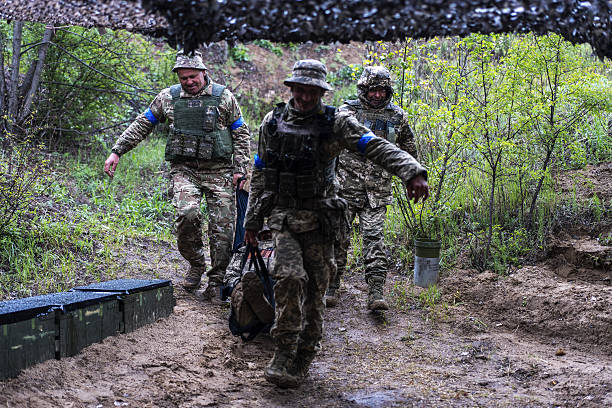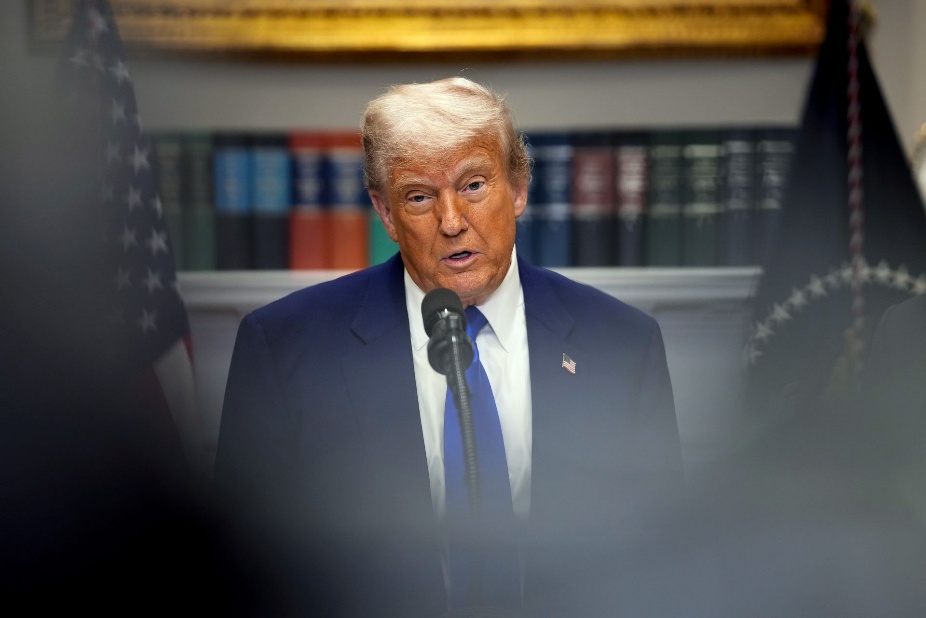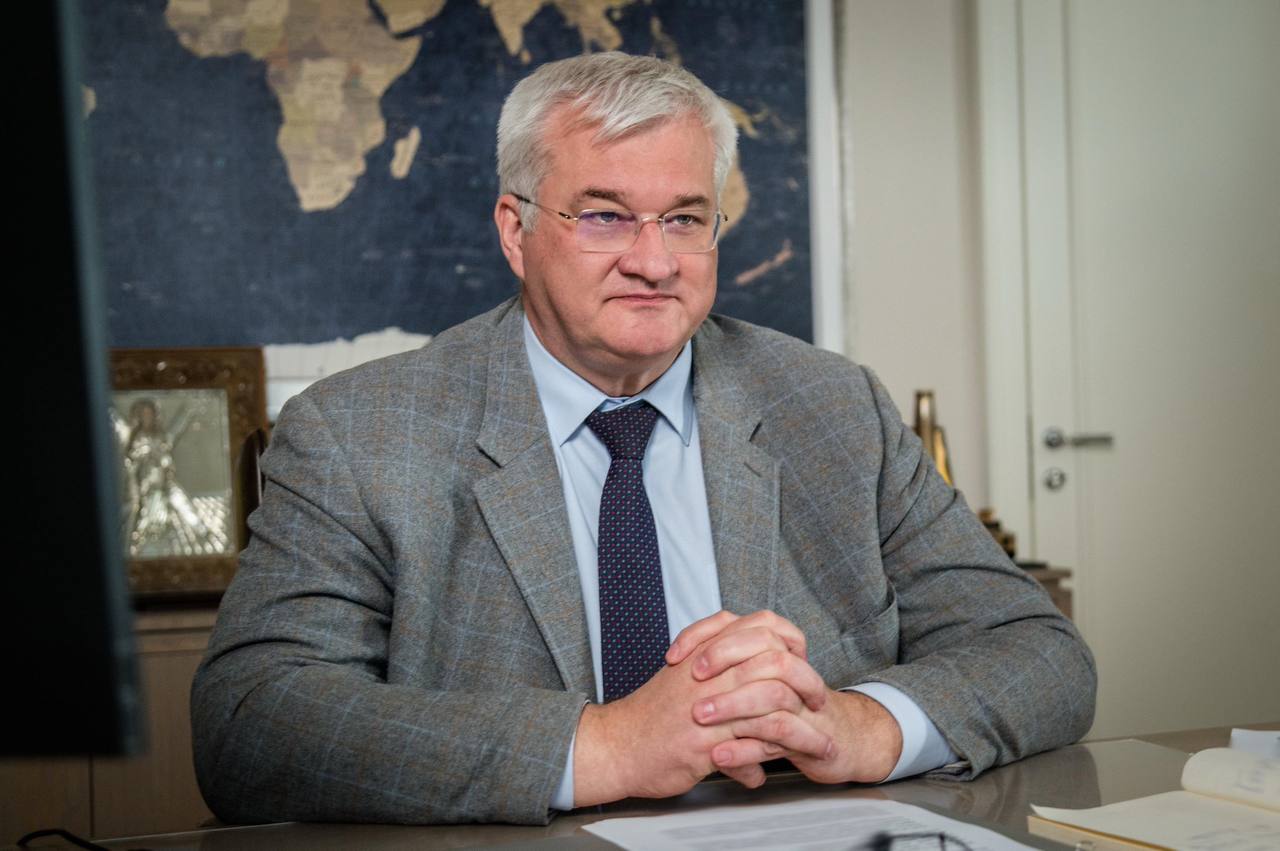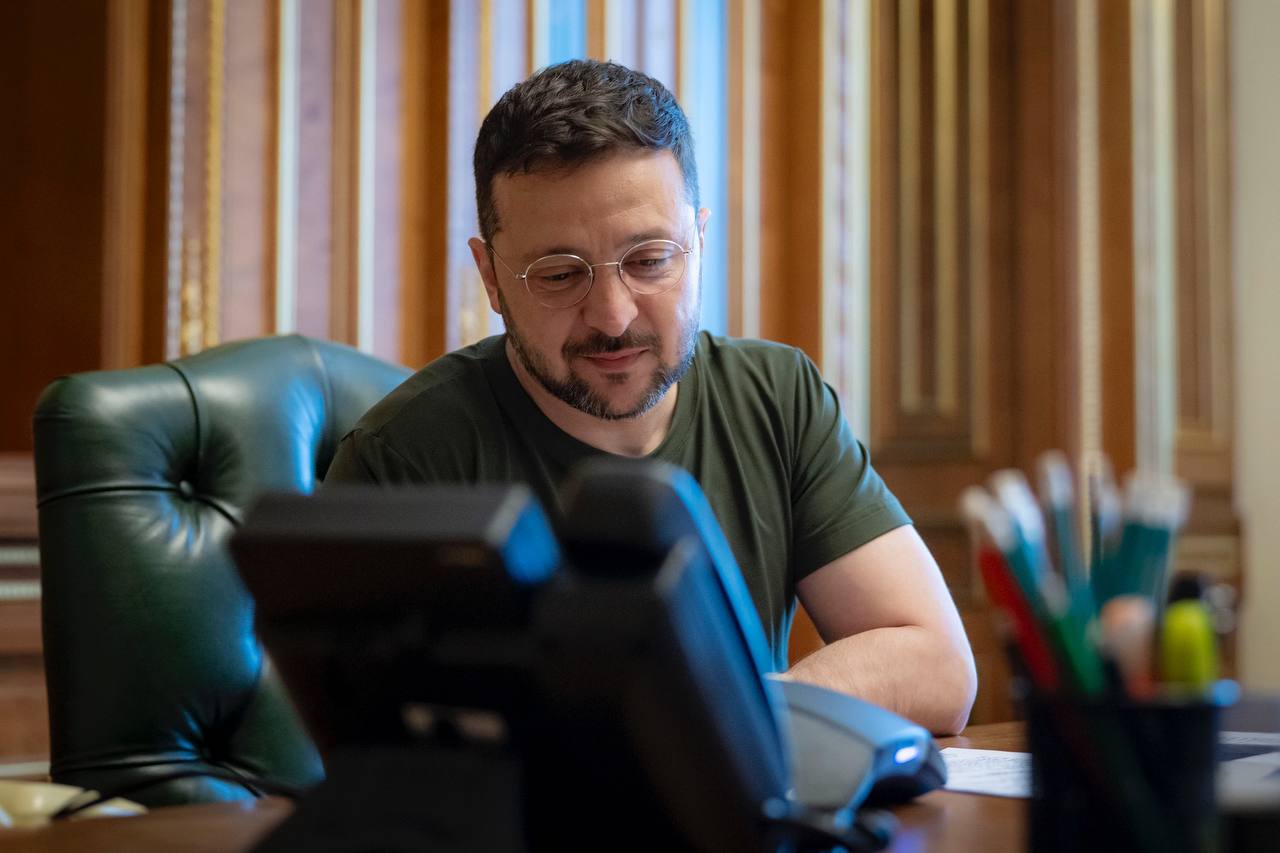As Germany Issues Midnight Sanction Threat to Russia, Zelensky Accepts Putin’s Invitation While Trump Signals Possible Personal Attendance at Istanbul Talks
Summary of the Day – May 12, 2025
In a day of rapid diplomatic maneuvers, Germany delivered an ultimatum to Russia: accept a 30-day ceasefire by midnight or face new European sanctions. Meanwhile, President Volodymyr Zelensky upended the diplomatic chessboard by accepting Vladimir Putin’s invitation to direct talks in Istanbul, declaring he would “personally” await the Russian leader on Thursday. U.S. President Donald Trump injected new uncertainty, suggesting he might attend the summit himself. The diplomatic dance played out against continued Russian attacks, with overnight drone strikes injuring seven civilians, the elite FSB Presidential Regiment deployed to Chasiv Yar, and a freight train struck in Donetsk Oblast. European foreign ministers gathered in London to coordinate their response, the EU prepared its 17th sanctions package, and Polish authorities closed a Russian consulate in retaliation for alleged sabotage operations, creating a multi-dimensional crisis that tests the resilience of both Ukraine’s military defenses and diplomatic positioning.

Ukrainian infantrymen from the 68th brigade undergo training on tactical combat medicine in Donetsk Oblast. (Jose Colon/Anadolu via Getty Images)
Germany’s Midnight Ultimatum: The Diplomatic Clock Ticks
Germany issued a stark ultimatum to Russia on Monday, giving Moscow until midnight to implement a 30-day unconditional ceasefire in Ukraine or face new European sanctions. “The clock is ticking — we still have 12 hours until the end of this day,” German government spokesperson Stefan Kornelius stated, confirming that Berlin was coordinating with European partners on potential penalties.
The ultimatum followed Russia’s rejection of the ceasefire proposal backed by Ukraine, France, the UK, Germany, and Poland during their weekend summit in Kyiv. Kremlin spokesperson Dmitry Peskov immediately dismissed Germany’s deadline, declaring, “This kind of ultimatum language is unacceptable for Russia. It’s not appropriate. You cannot talk to Russia in this language.”
Despite the proposed truce, Russian attacks continued across Ukraine on Monday, with at least 22 people injured in the past 24 hours. In a clear signal that Russia was ignoring the ceasefire deadline, a Russian drone struck a civilian freight train in Donetsk Oblast, injuring its driver.
Zelensky’s Bold Challenge: Awaiting Putin in Istanbul
President Zelensky announced he would attend talks in Istanbul on May 15, directly challenging Putin to show up in person. “I will be waiting for Putin in Turkey on Thursday. Personally. I hope that this time the Russians will not look for excuses,” Zelensky stated in a social media update.
The announcement came in response to Putin’s May 11 invitation for Ukraine to engage in direct talks, though the Russian leader avoided mentioning a ceasefire and has not yet formally confirmed whether he would attend personally. The Kremlin has remained conspicuously silent on Zelensky’s direct challenge throughout Monday.
Presidential Office chief Andriy Yermak reinforced Ukraine’s position in an interview published Monday, questioning whether any Russian official besides Putin could deliver meaningful results. “Do you know who else in Russia makes decisions of this level and is able to ensure their implementation?” Yermak asked. “Of course, he (Putin) will delegate the technical and preparatory stages, but we understand who is ultimately in charge.”
Trump’s Diplomatic Insertion: U.S. President Considers Istanbul Trip
U.S. President Donald Trump expressed optimism about the potential meeting, stating, “I think we may see a good result from Thursday’s meeting in Turkey between Russia and Ukraine. I believe both leaders are going to be there. I even thought about flying over — I’m not sure where I’ll be on Thursday, I have so many meetings.”

U.S. President Donald Trump speaks during a press conference in the Roosevelt Room of the White House, in Washington, DC. (Andrew Harnik / Getty Images)
Trump claimed that he strongly advocated for the Istanbul meeting, calling it a critical opportunity to end the war. “Thursday’s meeting between Russia and Ukraine is very important. I strongly pushed for it to happen. I think good things can come from it,” the U.S. president said during a press conference.
Zelensky welcomed Trump’s interest, calling it “the right idea” and stating that “all of us in Ukraine would appreciate it if President Trump could be there with us at this meeting in Turkey. President Erdogan can indeed host highest-level meetings.”
Mixed American Signals: State Department Emphasizes Ceasefire
The U.S. State Department reaffirmed on Monday that securing an immediate ceasefire in Ukraine remains the United States’ top priority, despite Trump’s apparent enthusiasm for talks without preconditions. U.S. Secretary of State Marco Rubio emphasized this commitment during a call with U.K. Foreign Secretary David Lammy.
“Our top priority remains bringing an end to the fighting and an immediate ceasefire,” the State Department readout said, citing Rubio. The secretary of state also held a phone call with German Chancellor Friedrich Merz, discussing a recent meeting of European and Ukrainian leaders in Kyiv and the “shared goal of ending the war in Ukraine.”
The seemingly contradictory signals from the U.S. president and his State Department highlighted the complex dynamics within American foreign policy as the peace process gained momentum.
London Foreign Ministers’ Gathering: Coordinating the Western Response
Ukrainian Foreign Minister Andrii Sybiha joined a ministerial meeting in London on Monday, connecting with counterparts from the UK, France, Germany, Italy, Spain, Poland, and the European Union via video link. The gathering focused on coordinating peace efforts and joint work with the United States.

Ukrainian Foreign Minister Andrii Sybiha during a virtual meeting with his counterparts at the Ministry of Foreign Affairs in Kyiv, Ukraine. (Ministry of Foreign Affairs of Ukraine / Telegram)
Speaking after the meeting, Sybiha thanked U.K. Foreign Secretary David Lammy for convening the allies in what he called an “effective and regular format” and said discussions focused on coordinating peace efforts. He shared front-line intelligence from Commander-in-Chief Oleksandr Syrskyi, confirming that Russian forces had ignored the proposed ceasefire and continued attacking Ukrainian positions across the front.
“This week will be decisive for peace and accountability,” Sybiha stated, adding that ministers discussed tougher sanctions against Russia’s banking sector, central bank, and energy industry, potentially to be introduced alongside new defense aid packages.
Turkish Diplomatic Channel: Erdogan Ready to Facilitate
President Volodymyr Zelensky held a phone call with Turkish President Recep Tayyip Erdogan on Monday to discuss the details of a proposed meeting in Turkey. “I am grateful for the support and the readiness at the highest level to promote diplomacy,” Zelensky said. “We share the same view on the need for a ceasefire.”
In a read-out provided by the Turkish president’s office, Erdogan “emphasized that he considers the resumption of direct talks between Russia and Ukraine to be extremely important and stated that (Turkey) is ready to provide the necessary support at every stage of the process.” The statement added that Turkey would be “pleased to host the Russian and Ukrainian delegations.”
In a parallel diplomatic channel, Russian Foreign Minister Sergey Lavrov held a phone call with Turkish Foreign Minister Hakan Fidan on the same day to discuss the proposed Istanbul meeting. No details were immediately released about the content of the conversation.
Removing Legal Obstacles: Ukraine Dismisses 2022 Decree Concerns
A source in Ukraine’s president’s office on Monday dismissed concerns that a 2022 decree could prevent Zelensky from meeting with Putin. In the fall of 2022, Zelensky signed a decree that “stated the impossibility of holding negotiations with Russian President Putin,” as a response to Russia’s illegal annexation of Ukrainian territories.
Moscow has cited Zelensky’s decree as a ban on talks with Putin and used it as an excuse for avoiding direct talks with Kyiv. According to the source, the decree was a “signal to those in Ukraine who wanted to speak (to Russians) bypassing the central government” rather than a binding prohibition on presidential diplomacy.
“Back then we stated the impossibility, now we can state the possibility, the president as the head of state determines this,” the source added. “There is no ban as such, the Russians twisted it.” The source emphasized that Ukraine’s constitution clearly states that the president represents the state in international relations and that “the constitution is always above a presidential decree.”
Overnight Drone Assault: Seven Injured in Multiple Regions
Russian forces conducted a series of drone strikes against Ukraine on the night of May 11 to 12, the Ukrainian Air Force reported. Russian forces launched 108 Shahed and decoy drones from multiple locations, including Bryansk and Oryol cities; Shatalovo, Smolensk Oblast; Millerovo, Rostov Oblast; Primorsko-Akhtarsk, Krasnodar Krai; and occupied Cape Chauda, Crimea.
Ukrainian forces downed 55 Shahed and other drones over northern, eastern, southern, and central Ukraine and lost sight of 30 decoy drones during the strike. The Russian drone strikes affected Odesa, Mykolaiv, Donetsk, Zhytomyr, and Sumy oblasts, injuring at least seven people in what Ukrainian officials pointed to as clear evidence of Russia’s disregard for the proposed ceasefire.
Video recorded in Odesa region showed a major fire burning in the vicinity of a rail bridge near the village Zatoka, on the Black Sea shore. Russian forces have attacked the link—thought to be a choke-point of Western military aid moving east to Ukraine—repeatedly since the full-scale invasion.
Rail Attack: Russian Drone Strikes Freight Train
A Russian drone hit a civilian freight train in Donetsk Oblast on Monday and injured its driver, Ukrainian Railways reported, providing concrete evidence that Moscow was ignoring international calls for a ceasefire. “Truce proposals are being ignored, attacks on railway infrastructure continue,” Ukrainian Railways said on Telegram.
“As a result of the attack on the locomotive, the driver suffered a shrapnel wound to his leg. His life is not in danger.” According to the statement, the attack failed to halt railway traffic despite the direct hit on critical transportation infrastructure.
Ukraine’s railway infrastructure has played a crucial role during Russia’s all-out war and has been repeatedly targeted by Russian attacks. The incident occurred on the same day Ukraine and its European allies had proposed their 30-day unconditional truce to begin.
Elite Deployment: FSB Presidential Regiment to Chasiv Yar
Russian forces attempting to capture the strategic city of Chasiv Yar have been bolstered by the elite FSB Presidential Regiment, according to Ukrainian military sources on Monday. The deployment signals Moscow’s increasing difficulty in the months-long battle for the Donetsk Oblast town.
“These are top-level specialists. Now we have to face very intense fighting, and very accurate and precise work,” said Ivan Petrychak, spokesperson for the 24th Separate Mechanized Brigade. “If the Russians are using this level of specialists in urban combat, they are probably facing some difficulties as well.”
The FSB Presidential Regiment, also known as the Kremlin Regiment, is normally responsible for the security of the Kremlin, its valuables, and state officials, as well as ceremonial duties at the Tomb of the Unknown Soldier in Moscow. Its deployment to the frontline marks an unusual step for a unit not typically involved in combat operations abroad.
Truce Violations Reported: Border Service Confirms Continued Attacks
Russia did not fully halt its attacks on Ukraine during its self-declared Victory Day ceasefire, continuing daily strikes with various weapons, Andrii Demchenko, spokesperson for Ukraine’s State Border Guard Service, said on Monday. “I can confirm that both now and during the so-called three-day ceasefire, (Russia) never fully stopped striking Ukrainian territory,” Demchenko said.
“Perhaps in some areas, the intensity decreased slightly to create an image of compliance with their own announcement. But in reality, (Russia) continued attacks every day, using all available weapons — including aircraft to drop guided bombs on Ukraine,” he added.
Previously, Russian President Vladimir Putin unilaterally declared a “humanitarian truce” from midnight May 8 to midnight May 11. President Volodymyr Zelensky had dismissed the proposal as a “theatrical performance,” accusing Putin of manipulating the international community by declaring brief ceasefires that it has no intention of following.
Economic Pressure: EU to Unveil 17th Sanctions Package
The European Union plans to unveil its 17th package of sanctions against Russia on May 14, according to an EU official speaking on condition of anonymity. The new measures are expected to target Russia’s military-industrial complex, shadow shipping fleet, and related support networks that have helped Moscow evade previous economic restrictions.
“What we do on our side is to continue our pressure on Russia, be it with sanctions, be it with our support, be it on military humanitarian throughout all the strengths,” European Commission Foreign Affairs Spokesperson Anita Hipper stated on Monday.
The EU has often faced opposition from some member states, namely Hungary, in implementing certain sanctions, at times forcing the bloc to water down the packages. Paula Pinho, the chief commission spokesperson, commented that “whenever and when the proposal in the initiative starts with the (European) Commission in terms of sanctions, obviously there are discussions with all the member states to make sure that this can really go through.”
Financial Support: EU Directs $1 Billion to Ukraine Defense
The EU is allocating 900 million euros ($1 billion) from profits generated by frozen Russian assets to fund weapons and ammunition for Ukraine, EU Deputy Secretary General for Peace, Security and Defense Charles Fries announced on Monday. The new tranche brings total recent EU defense support to 3.3 billion euros ($3.6 billion), focusing on Ukraine’s drone and missile production.
Fries said contracts signed last week in Lviv will channel the funds into modern sectors of Ukraine’s defense industry, including drone and missile production. On May 9, EU Foreign Affairs Chief Kaja Kallas and foreign ministers signed a landmark agreement in Lviv to transfer 1 billion euros ($1.1 billion) in profits from frozen Russian assets to Ukraine.
Since Russia launched its full-scale invasion in 2022, Western countries have frozen approximately $300 billion in Russian sovereign assets. In October 2024, the Group of Seven approved nearly $50 billion in loans for Ukraine to be repaid from the proceeds of those frozen funds.
Diplomatic Escalation: Poland Closes Russian Consulate Over Sabotage
Poland revoked permission for Russia to operate a consulate in Krakow over evidence that Russian intelligence services orchestrated an arson attack in Warsaw last year, Polish Foreign Minister Radoslaw Sikorski announced on Monday. “In view of evidence that it was the Russian intelligence services that carried out the reprehensible sabotage act against the shopping center at Marywilska Street, I have decided to withdraw permission for the operation of the Russian consulate in Krakow,” Sikorski wrote.
Russian Ambassador Sergei Andreev was summoned to Poland’s Foreign Ministry on Monday to receive a diplomatic note formally withdrawing consent for the operation. Polish Deputy Foreign Minister Henryka Moscicka-Dendys reportedly said Russia will be given a deadline, typically at least 30 days, to shut down the post, while its consulate in Gdansk will remain open.
Polish Justice Minister Adam Bodnar and Interior Minister Tomasz Siemoniak confirmed Moscow’s role in the attack, citing detailed intelligence. “We have in-depth knowledge of the order and course of the arson and the way in which the perpetrators documented it. Their actions were organized and directed by an identified person staying in the Russian Federation,” the ministers said.
Sabotage Investigation: Two Ukrainians Charged in Polish Case
Polish prosecutors charged two Ukrainian citizens in connection with a suspected Russian operation to orchestrate a series of arson attacks in EU countries, including the 2024 fire at the Marywilska shopping center in Warsaw. According to the official statement released Monday, the Ukrainian nationals were involved in a criminal group acting on Russia’s behalf, accused of carrying out acts of sabotage by setting fire to large commercial facilities across the EU.
One of the suspects, presented by Polish prosecutors only as Daniil B., was born in 2006. The investigation indicates that Daniil B., acting under the orders of another Ukrainian suspect, Oleksandr V., documented the Warsaw fire and sent the footage to be used in Russian propaganda.
“During the investigation, evidence was obtained to determine that this fire was the result of arson by members of an organized criminal group acting on behalf of the intelligence of the Russian Federation,” the statement read. “The purpose of the group’s activities was to set fire to large-scale facilities in the European Union countries,” the Polish Prosecutor’s Office said.
French Response: Elysée Palace Dismisses Russian Disinformation
The French Presidential Office on Monday dismissed a fake story pushed by Russia about a paper napkin seen during European leaders’ visit to Kyiv. Russian Foreign Ministry spokesperson Maria Zakharova spread a claim that footage of a train carriage with French President Emmanuel Macron, UK Prime Minister Keir Starmer, and German Chancellor Friedrich Merz showed a “bag and spoon” for drugs.
“When European unity becomes inconvenient, disinformation goes so far as to make a simple tissue look like drugs,” the Elysee Palace responded on social media, showing a close-up of the tissue. “This fake news is being spread by France’s enemies, both abroad and at home. We must remain vigilant against manipulation.”
Mocking Russian claims, the French Presidential Office added a description to the picture, saying: “This is a tissue. For blowing your nose.” The three European leaders, along with Polish Prime Minister Donald Tusk, had visited Kyiv on May 10 to meet President Zelensky and reaffirm their commitment to Ukraine.
MH17 Accountability: ICAO Council Holds Russia Responsible
The Council of the International Civil Aviation Organization (ICAO) concluded on Monday that Russia was responsible for downing flight MH17 in July 2014. The ruling came following a case brought by the Netherlands and Australia in 2022, with a “large majority” of ICAO members finding Russia responsible.
Flight MH17 departed from Amsterdam en-route to Kuala Lumpur on July 17, 2014, when it was shot down by a Buk surface-to-air missile above Ukraine’s Donetsk Oblast. All 283 passengers and 15 crew members aboard were killed, including 196 Dutch citizens.
“In the coming weeks the ICAO Council will consider what form of reparation is in order,” Dutch Foreign Minister Caspar Veldkamp said. “In that context the Netherlands and Australia are requesting that the ICAO Council order the Russian Federation to enter into negotiations with the Netherlands and Australia, and that the Council facilitate this process.”
Border Disruption: Polish Truckers Block Ukraine Crossing
Polish truckers launched a new border blockade at the Yahodyn-Dorohusk checkpoint, Ukraine’s State Border Guard Service reported on Monday. The protesters are allowing just one vehicle to enter and one to exit every hour in what organizers warned could become a four-month demonstration.
“Buses and vehicles transporting humanitarian aid will pass unhindered,” Ukraine’s border guards stated, citing the Polish side. The organizers presented the protest as an effort to draw attention to the “plight of transport companies and the threat to thousands of jobs” in Poland’s transportation sector.
The mayor of Dorohusk previously banned the blockade at the border crossing, arguing it is a critical infrastructure facility. The District Court in Lublin later overturned this decision, allowing the protest to proceed. By noon, Ukrainian border guards reported that traffic was flowing normally, but just over two hours later, Polish politician Rafal Mekler, from the far-right Confederation party, posted on social media: “We are already in Dorohusk. The border is at a standstill.”
Spy Ring Conviction: UK Court Sentences Russian Network
A London court on Monday sentenced six Bulgarian nationals to prison terms for operating a Russian espionage network in Britain. Orlin Roussev, identified as the ringleader, was sentenced to 10 years and 8 months for conducting six espionage operations that threatened UK national security. Judge Nicholas Hilliard described Roussev’s actions as posing a serious threat to the country.
Roussev’s deputy, Bizer Dzhambazov, received a sentence of 10 years and 2 months. Both men had pleaded guilty. Katrin Ivanova, who was recruited by Dzhambazov, was sentenced to 9 years and 8 months, while Vanya Gaberova received 6 years, 8 months, and 3 weeks.
Police uncovered thousands of communications linking Roussev to fugitive Jan Marsalek, a former executive at financial services company Wirecard, accused of coordinating the Bulgarian network from abroad. Western intelligence agencies believe Marsalek used Wirecard to funnel money supporting covert Russian operations worldwide.
Minerals Deal Finalized: Ukraine Ratifies U.S. Agreement
Ukraine completed the ratification of the U.S.-Ukraine minerals agreement on Monday, with President Zelensky signing the deal that had been approved by the Verkhovna Rada on May 8. The agreement establishes a Reconstruction Investment Fund jointly managed by Kyiv and Washington and gives the U.S. special access to projects developing Ukraine’s deposits of critical minerals, including lithium, titanium, and rare earth elements.
The finalization caps a months-long, often contentious negotiation process between Kyiv and Washington over critical minerals cooperation. Signed on April 30, the deal establishes a Reconstruction Investment Fund jointly managed by Kyiv and Washington under an equal partnership model.
The agreement emerged after months of difficult talks that strained relations between the U.S. and Ukraine. Plans to sign the deal in late February collapsed following a heated White House argument between Zelensky and President Trump.
Demining Support: Taiwan Pledges $2 Million for Ukraine
Taiwan intends to contribute up to $2 million for demining efforts in Ukraine, Lithuania’s Defense Ministry announced on Monday. “Lithuania, which is leading the international demining capability coalition for Ukraine, welcomes Taiwan’s interest in supporting this critical humanitarian initiative,” a statement from Lithuania’s Foreign Ministry read. “The removal of explosive hazards remains one of the most pressing challenges for Ukrainian civilian safety and economic recovery.”
Ukraine remains the most mined country in the world, with nearly one-third of its territory, approximately 174,000 square kilometers, having been mined since Russia began its full-scale invasion in February 2022. Over 400 civilians have been killed and approximately 1,000 more injured by mines since the start of Russia’s full-scale invasion, according to U.N. monitors.
Despite ongoing hostilities, Ukraine has reduced the area considered as potentially hazardous by over 35,000 square kilometers. Ukraine’s Defense Ministry said on Feb. 26 that Ukraine expects to receive about $732 million in demining equipment by 2034 from Western allies.
Papal Dialogue: Zelensky Speaks with Pope Leo XIV
President Zelensky spoke with Pope Leo XIV in their first phone call on Monday, describing the discussion as “warm” and “substantive.” The conversation marked the first publicly known official call the new pope held with a foreign leader since taking office.

President Volodymyr Zelensky in a photo published. (President Volodymyr Zelensky/Telegram)
“I invited His Holiness to make an apostolic visit to Ukraine. Such a visit would bring real hope to all believers and to all our people,” Zelensky said, adding that the two leaders plan to hold an in-person meeting in the near future. Zelensky thanked the pontiff for his support and discussed efforts to bring back Ukrainian children abducted by Russia, saying, “Ukraine counts on the Vatican’s assistance in bringing them home to their families.”
Pope Leo XIV, formerly Cardinal Robert Prevost, was elected as head of the Catholic Church on May 8 after the death of his predecessor, Pope Francis. In his first Sunday address on May 11, he called for an “authentic and lasting peace” in Ukraine, adding that he carries in his heart the “suffering of the beloved people of Ukraine.”
